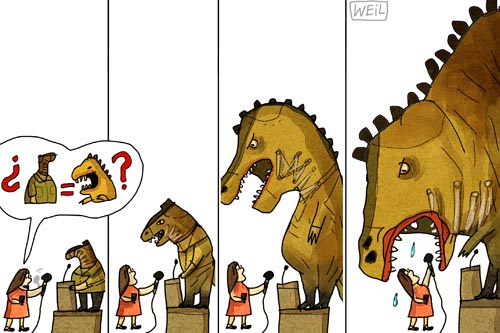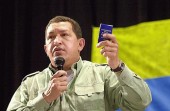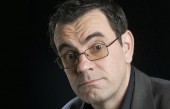Under Chávez: Media Harassed with Online Hacking, Phone Tapping and Censorship
by Gregorio Salazar / January 23, 2012 / 1 Comment
“If not for the media, I would have 80% popularity.” – Hugo Chávez

Venezuelan cartoonist Roberto Weil portrays President Hugo Chávez as a boot in response to a law which prohibits depictions of the likeness of the president and of patriotic symbols.
On Friday, December 2nd while Caracas was decked out to host thirty two heads of state for the Community of Latin American and Caribbean States‘ (CELAC) inaugural summit, several media outlets, universities, and organizations with critical views of the Venezuelan government claimed to have had their email and social media accounts hacked.
The fact that Caracas has been the headquarters for the creation of a new democratic forum that could improve dialogue and consensus in Latin America can give the impression that life in Venezuela operates within the boundaries of a democratic country where, despite any ups and downs of conflict, human rights retain a special place.
- President Hugo Chávez Frías

- Nov. 1992: Attempted to overthrow the government of Carlos Andrés Peréz
- Feb. 1999: Takes office after winning 1998 election
- July 2000: Re-elected under new constitution for a six-year term
- Apr. 2002: Abortive coup. Chavez returns to power after two days.
- Aug. 2004: Wins recall referendum on whether he should serve out rest of his term
- Dec. 2006: Wins another six-year term with 63% of the vote
- Dec. 2007: Loses constitutional referendum which included proposal to allow the president to run indefinitely for office
- Feb. 2009: Wins referendum that lifts term limits on elected officials
- Sep. 2010: Chavez party wins majority in National Assembly elections but opposition gets some 40% of seats
- Hacked: Prominent Figures

- – Comedian Laureano Márquez
- – Rector of Central University of Venezuela Cecilia García Arocha
- – Poet, writer, and television producer Leonardo Padrón
- – Political activist and student representative David Smolansky
- – Director of the School of Economics of UCV José Guerra
- – Host of the popular show Radar de los Barrios Jesús Torrealba
- – Leftist politician Douglas Bravo
- – Journalist Milagros Socorro
- – Journalist Sebastiana Barráez
- – Social fighter Luis Trincado
- – Director of polling company Luis Vicente León
However, that was not the impression that presented itself the day the hacking victims stepped forward. The list of victims included people that play important political and institutional roles, artists, journalists, and well-known citizens like the famed comedian Laureano Márquez. They declared themselves victims of the “computer terrorism policy enforced by the government of Hugo Chávez Frías.”
Besides Márquez, those “hacked” were the rector of the Central University of Venezuela (UCV), Cecilia García Arocha; the poet, writer, and television producer Leonardo Padrón; the political activist and student representative David Smolansky; the director of the School of Economics of UCV, José Guerra; the host of the popular show Radar de los Barrios, Jesús Torrealba; and the ex-guerilla fighter and leftist politician Douglas Bravo, who reported that the Venezuelan government “not only disrespected freedom of expression, but sought to intimidate us and a move us away from public debate.” The full list is much more extensive and includes journalists like Milagros Socorro and Sebastiana Barráez; social fighters like Luis Trincado; directors of polling companies like Luis Vicente León; and others.
Some of them, after concerted effort, recovered control of their accounts. Others remained powerless as their names and accounts were used to attack and insult dissidents, political leaders, and anyone that identified with the opposition.
To form an accurate assessment of the reality of Venezuela—whether the arena be political, social, or economic—is a truly complex and laborious task. With certainty, there is no other country in Latin America where such a high contrast exists between the two poles that divide Venezuelan society. We can choose any subject at random and the perceptions will always be mutually exclusive: On one side is the vision that the independent media shows; on the other is the enormous propaganda apparatus, installed by Chávez with a multi-million dollar investment.
For example: Is the state oil company PDVSA in a situation of debt and operational debacle or has it become a revolutionary model of administration and efficiency? Has poverty been reduced to minimal levels like the official propaganda insists, or are the rates stagnant despite the fact that the government has used Venezuela’s revenue from international oil sales for proselytism purposes? Do Venezuelans enjoy the highest level of freedom of expression in their history, like the Revolutionary government claims, or is it a reduced, beaten right, under permanent siege since Hugo Chávez installed himself in power in 1999? The latter is a debate that remains, despite the fact that during Chávez’s term there have been more than a thousand documented assaults against freedom of expression. The list of assaults includes a range of all possible affectations against the media and journalists, from verbal abuse to the closure of television and radio stations.
The crucial theme of freedom of expression is constantly at the center of the debate, which involves, of course, competing sectors, but also Latin American social movements, national and international NGOs, and the Inter-American Commission on Human Rights and United Nations Commission on Human Rights, who frequently issue reports on conditions in the country. Despite forceful evidence about the situation of freedom of expression in Venezuela, there is no way to conciliate positions between the parties involved.
Continue reading this article on page 2





One Comment on "Under Chávez: Media Harassed with Online Hacking, Phone Tapping and Censorship"
POEM AS A COMMENT
(to Te Kupu and all the unknown and well known poets
for a proposal of behaviour poetry)
What is
this very noisy silence
and heart palpitation
shiness-and-violence
man under man,
man on man
and environment;
what does it really mean ?
all over the world ?
What is
this planet
if not a biodiversity
common country
of all the creatures
included human being
Yes a commpom country
to respect
in the social and environmen
for a future of peace
and real justice
with nobody injured
or dead
to be called foreigner?
Who do we think we are
only because
we have hands
and things to be made
in China
or elsewhere
and economic crisis
but not for the rich people
who become richer
even more
and no reputable Vip
in mass media ?
What does all this man
in democracy really
to be called honest
and not a bluff ?
What is it
living
in a wonderful planet
all this pollution
and violence
to be forced considering
normal things
or evidet uthopia ?
When no respect
is given
and peace is denied
and blood make poppies
to run over the rocks
of a desert or plop for a bang
of stupid arrogant servilism
as a golden bullet
in the midle of front
of the needy
and no filter in photography
of correct reportage ?
What does it mean,
what is it
this absurd absence
of dignity and freedom
in poetry
and no economic compensation?
Publishers as dictators
and mass medias servilism
at global level
why we have to hush
all this about and not to shout
our absence of honest real poetry
fighting will
against lies of publishers
and evident invisible chains?
Fellow poets
at global level,
chin up !
Come on,
this is time
of behaviour poetry
I do not hush
I denounce
I risk no publication
or injuries and prison
for myelf as an author
and my hard working
and dreams of children
tpo make them true
We want peace
we want love
we want reaòl friendship
among the people
and real social justice
for everybody
and respecting nature
environment
at global level
poets of world unite
make yourself and working
behaviour poetry .
Do not serve tiranny,
having dignity
in order to make better
this overwhealming power
of man on man
and man on nature
and environment
in iots whole
Let’s have dicnity
Nobody pay us to be servants
of poetry
What all this mean and is ?
No more complicity
by silence and shiness
Poetry is Poetry
poets must have a dignity
and not to be servants of anybody
We have a task,we are poets,
To escape from a prison
of silence in poetry
and servilism very loud noise
and free poetry
wonderful innocent butterfly
or coloured bird
or white dove
unjustly and cruelly put in a cage
by the establishment.
of the invisible chains
of worldwide status quo-
P-S- The author apologise with the readers
for possible spelling mistakes
he is not Englishmother language
and has been operated for cataracts.
Poem by Vladimiro Rinaldi
born Italy,Rome,on the 16th March 1942,
in the working class area
of i Tiburtino Terzo-